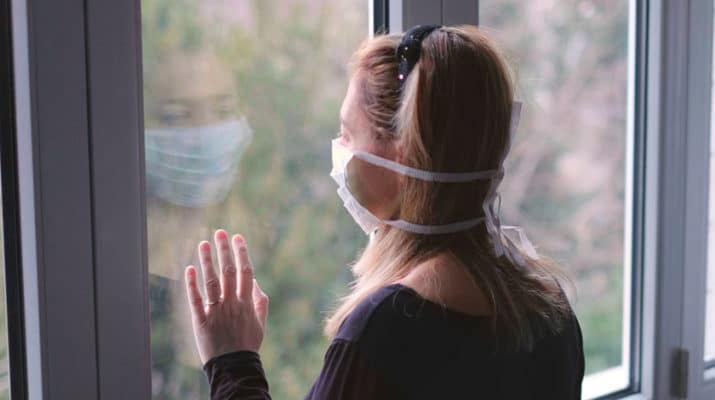Situation may worsen after economy reopens, says expert
By Payne Horning

Months of isolation, rising unemployment and general uncertainty have taken a toll on the nation’s mental health.
Forty-five percent of the people the Kaiser Family Foundation polled in a recent survey said the virus has negatively affected their mental health — 19% of whom said that it had a major impact — and crisis hotline services across the country have reported major volume increases since the start of the outbreak.
Even as states like New York slowly reopen and people are finally able to gather together and return to some of their regular routines, mental health providers say the situation won’t necessarily get better. In fact, they are concerned that it could get worse.
“My experience with mental health issues is people deal with the crisis at hand really well and it’s when things lighten up and seem to be going back to normal that people fall apart,” said Sherie Ramsgard, a psychiatric nurse practitioner and owner of Whole Mental Wellness clinic in Fayetteville.
Ramsgard said the past few months of widespread quarantine have been a traumatic experience for many, not just those who struggle with anxiety and depression. As a result, Ramsgard said, people in the coming months may start struggling with what is essentially post-traumatic stress syndrome (PTSD).
“We disassociate with the things we can’t help right now and put it in a little box and we just try to get through with the things we can handle on a daily basis,” Ramsgard said. “But once things lighten up, we start having nightmares, we start having flashbacks, and all of the things we put in a little box starts seeping out because our body has to experience it.”
That fallout from the pandemic could be severe. A recent study from Well Being Trust and the Robert Graham Center for Policy Studies in Family Medicine and Primary Care found that “deaths of despair” — those related to drug or alcohol misuse and suicide — are on the rise. The study projected that as many as 75,000 lives could be lost in this way as a result of the trauma from the nationwide quarantine.
Paul Joslyn, executive director of the Syracuse-based mental health provider AccessCNY, said the problem may be exacerbated by the fact that many providers may be unable to meet the coming increased need for treatment. The economic toll the virus has taken on the nation’s economy is depleting tax revenues that governments need to fund public and private services, including the work that nonprofits provide. New York officials say the state faces a $13-14 billion deficit for fiscal year 2020-2021.
To stem the potential losses, Joslyn is joining Central New York Rep. John Katko, North Country Rep. Elise Stefanik, and others in calling on Congress to increase the funding the federal government allocates to mental health providers in New York and beyond.
A group of national behavioral and mental health providers that includes the American Foundation for Suicide Prevention, the National Alliance on Mental Illness and the American Psychological Association recently sent a letter to Congress saying as much $38.5 billion may need to be allocated, which is the amount that the organizations expect they could lose in revenue over the next year due to the outbreak. The letter said without this robust investment, behavioral health organizations may not be able to keep their doors open, leaving tens of thousands without access to vital mental health treatment and addiction treatment.
The federal government is also being asked to continue the expansion of access to telehealth services, which is medical treatment provided to patients remotely through technology like video-streaming services. Use of telehealth has skyrocketed during the quarantine, aided in part by regulations that have been eased and the fact that many insurance companies and Medicare are now covering more of these services. Joslyn said one of the silver linings from this outbreak is the increasing number of people who have embraced this kind of technology, which has the potential to broaden access to treatment in a more efficient and cost-effective manner.
Moving forward, Ramsgard recommends that people capitalize on the coping skills they acquired during the pandemic. The statewide PAUSE forced many to get back to the “basics,” Ramsgard said, like paying more attention to sleep, exercise, diet and human connection. It’s important to stay focused on that short- and long-term.
“Mindfulness, slowing down, being more with nature, not feeling like we have to be on that hamster wheel 24/7 and that we do have to stop sometimes and breathe and just take in the good around us and appreciate those flowers that are blooming and the sunshine,” Ramsgard said. “I think we get on autopilot so often and we just miss all of the small things in life — what’s that saying? You’re going to look back and realize that the small things were really the big things.”
Joslyn agrees that staying in contact with others, through whatever medium, is key. Just talking about your struggles with someone else can be therapeutic, he says.
To that end, the state established the New York State Emotional Support Hotline at 1-844-863-9314 where people can schedule a free appointment with a mental health professional.
New Yorkers can also access additional mental health resources at headspace.com/ny. And locally, people can call the National Alliance on Mental Illness (NAMI) Syracuse chapter at 315-487-2085.

